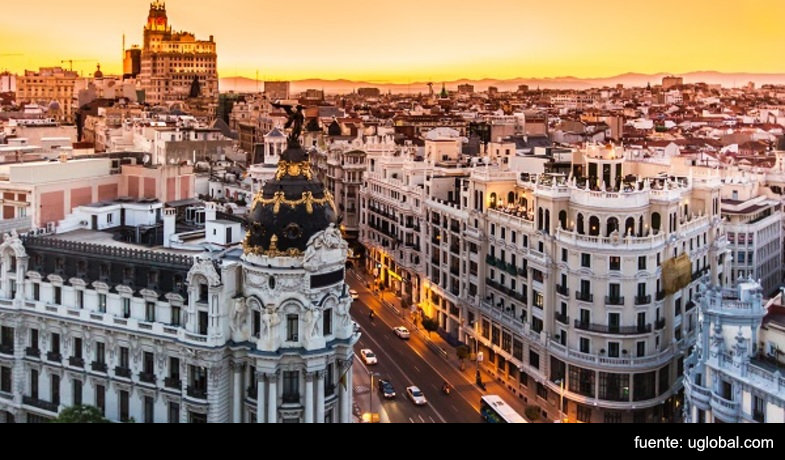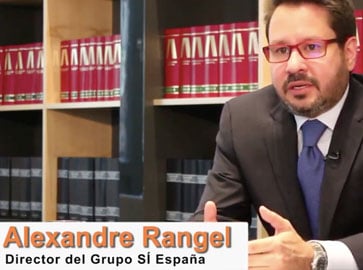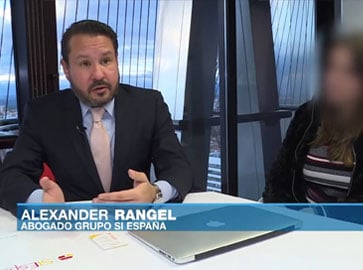Entrevista periodistadigital.com Fuente: periodistadigital.com Arepa, el taco está contigo». La frase de apoyo de la…

How to become a legal resident in Spain with or without investment
fuente: uglobal.com
Spain is becoming a hot spot destination for medium and high net worth individuals who are looking for a new legal residence and a second passport. Spain was the second most visited country in the world with almost 83 million visitors last year. However, Spain is not only attracting foreign nationals for its culture and well-known gastronomy, but it also offers attractive and flexible immigration alternatives.
Currently, it is not necessary to invest or live in Spain to become a resident. Foreign nationals can choose the legal route that fits their short or long-term immigration and personal needs. In addition, the legal time frames and procedures are well established providing a great amount of confidence for the applicants.
Spain offers two ways to become a legal resident. There is the residence by investment program, also knows as the “Golden Visa,” and the non-lucrative residence option. These programs do not require employment or a family-based petition.
“GOLDEN VISA” RESIDENCE BY INVESTMENT PROGRAM
In order to attract foreign investors after the economic crisis in 2013, the Spanish government implemented the residence by investment also knows as the “golden visa” program for entrepreneurs.
Although, it has been nearly seven years since the law came into effect, it was not until the past three years that investors at a worldwide level started taking advantage of the benefits that the program has to offers. During the first years, it was mainly Chinese and Russian nationals who invested and moved to the Mediterranean coast of Spain. Today, due to the economic and social turmoil in many countries, particularly in Latin America, the program is attracting a broad range of foreign nationals who are investing across Spain to become residents.
The main requirement: a qualified investment
The residence by investment program allows a foreign national, who is not a citizen of a European Union country, to become a lawful resident by making a qualified and significant investment in Spain.
Qualified and significant investments are:
- Real estate investments of a minimum of 500,000 euros free and clear of any liens and encumbrances. The law allows the purchase of one or more properties across the Spanish territory as long as the investment minimum requirement is met. The property or properties can be used for any legal purposes.
- One-million-euro deposit in the investor’s bank account in Spain.
- Purchase of government bonds for 2 million euros or by investing at least 1 million euros in a company’s shares, investment or risk capital funds in Spain.
Today, the most common ways to obtain the residence by investment visa are through the purchase of real estate properties for a minimum of 500,000 euros or by making a 1 million euro deposit in the investor’s bank account in Spain.
The main benefits of the residence by investment:
The Spanish residence by investment program offers benefits that have gradually boosted the number of foreign investors during recent years. The main benefits can be summarized as follows:
- There is no physical presence requirement to maintain or renew the resident status. This particular benefit has been a decisive factor for many investors who are not ready to leave the day-to-day activities of their businesses overseas. Thus, they are allowed to continue living abroad and move to Spain when they are actually ready to do so.
- Investors keep full control of the investment. There are no third parties or companies involved during the entire immigration process. In the case of real estate investments, the property is owned directly by the investor. If the investor decides to deposit 1 million euros, the entire funds are maintained in the investor’s own personal bank account in Spain. The fact that the investment is under the full control of the investor, has provided a great amount of confidence to foreign nationals to move forward and invest in Spain.
- Investors can become legal residents while physically present as tourists in Spain. Currently, nationals of almost 60 countries are allowed to visit Spain for a maximum of 90 days without a visa, including nationals of most Latin American countries and the United States. Thus, investors and qualifying relatives can file their applications while in Spain. By law, the administration must approve or deny the application within 20 working days from filing. It means, for example, that investors can visit Spain, purchase the property during that time, and return to their home country with the residence card in hand. The residence by investment is initially granted for a two-year period and then extended for five-year periods as long as the investment is kept by the investor.
- Unmarried sons and daughters over 18 years old can be included in the residence process as long as they are financially dependent on the principal investor.
- Dependent family members can live in Spain without the principal investor.
- Investors are allowed to work without restriction in Spain. Although, most of the investors do not plan to be employed in Spain, a few do prefer to have the flexibility in case it is needed.
- Legal residents are not automatically considered tax residents if not physically present for more than 183 days in Spain. This is a great benefit to investors who can continue living overseas as non-residents for tax purposes in Spain.
These are some of the main benefits of the residence by investment program in Spain. The fact that foreign nationals can visit the country and become residents in a matter of days, definitively has provided a great confidence to investors. The program is an alternative for those individuals and families who want to secure a plan B or backup plan for the future. There is practically no risk involved under this program since the investors keep full control of the investment and are not even required to move to Spain. However, the program is not as well-known as it should be by now. Last year, it reached a record high and only 681 families obtained their residences through real estate investments.
NON-LUCRATIVE RESIDENCE: RESIDENCE WITHOUT INVESTMENT
The non-lucrative residence allows a foreign national to become a legal resident in Spain without having to invest. As its name implies, this residence does not authorize employment. Thus, the main requirement is to show evidence of sufficient financial means to live in Spain. The principal applicant and dependents are allowed to live and study, but not to work under the non-lucrative residence.
The fact that the non-lucrative residence does not allow one to work could be an issue at first for some foreign nationals. However, for most medium and high net worth applicants, immediate employment is rarely a priority. The majority want to be able to move their families to a safer country and travel without restrictions to continue developing business opportunities overseas. However, if employment becomes a necessity, under certain conditions and procedures, the non-lucrative residence can be changed to a work authorized residence.
The main requirement: evidence of financial means
The principal applicant must provide evidence of funds equivalent to 400% of the IPREM (Public Indicator of Multiple Effect Income) and 100% for each qualifying family member. The IPREM is an indicator similar to the poverty guidelines in the United States.
For 2020, the IPREM was set at 537.84 euros. Thus, the principal applicant must show evidence of at least 2,151.36 euros per month (537.84 x 4), and 537.84 euros for each qualifying dependent for the duration of the residence.
Frequently, foreign nationals believe that the non-lucrative residence is only for high-network individuals when indeed the required amounts are relatively low. This is due to the fact that the living costs are very affordable in Spain. However, the non-lucrative residence was not designed and is not recommended for individuals with limited funds to merely qualify for the first year of residence.
The residence process begins by requesting a non-lucrative visa at the Spanish consulate of the applicant’s country of current legal residence or nationality. The consulate can take up to 90 days to decide on the application. In general, the processing time is much shorter. Once approved, applicants get a 90-day residence visa stamped on their passports to be admitted as legal residents in Spain. The initial residence card is granted for one year once the applicants are physically present in the country. The non-lucrative residence can be extended for two-year periods as long as the financial requirement is still met.
The law about this visa is broad and ambiguous regarding the type of evidence that must be presented by the applicants to satisfy the financial requirement. However, most of the Spanish consulates around the world now expect the entire funds for the first year to be held at the applicant’s personal bank account at the time the application is filed. For the non-lucrative residence, the applicant’s bank account does not necessarily have to be at a Spanish bank. Thus, clear evidence of financial means for the entire first year is crucial to obtain the initial non-lucrative residence. In general, the process is very straightforward and most of the non-lucrative visa applications are being approved without major issues at the Spanish consulates around the world.
The main benefit of the non-lucrative residence:
The principal and most important benefit of the non-lucrative residence is to allow foreign nationals to become legal residents without having to invest in Spain. Additionally, an increasing number of prospective real estate investors, who do plan to move to Spain shortly, are also using the non-lucrative route to analyze the market before investing.
Main differences between the residence by investment “Golden Visa” and the non-lucrative residence:
- Requirement:
- The Golden Visa requires a qualifying investment.
- The non-lucrative requires evidence of financial means.
- Procedures:
- The Golden Visa can be requested directly in Spain.
- The initial non-lucrative residence must be requested at the Spanish consulate.
- Processing time:
- The Golden Visa must be approved or denied by law within 20 working days from filing.
- The Spanish consulate has up to 90 days to approve or deny the non-lucrative visa application.
- Physical Presence Requirement:
- The Golden Visa does not require investors to be physically present in Spain for a minimum period of time to maintain or extend their resident status.
- The non-lucrative residence does require foreign nationals to be physically present in Spain for at least six months per year to maintain and renew their resident status.
Most foreign nationals with sufficient funds to qualify for both options usually decide the legal route to take based on the length of time that they are expected to be physically present in Spain. If the plan is to move within a short period of time to Spain, the non-lucrative is usually the option to go with. On the other hand, if the principal investor does not plan to move right away, the Golden Visa is then the option.
- Work Authorization:
- The Golden Visa authorizes employment without restrictions.
- The non-lucrative does not authorize employment in Spain.
- Qualifying relatives:
- The Golden Visa allows unmarried sons and daughters over 18 years to be included in the immigration process as long as they are financially dependent on the principal investor.
- The non-lucrative residence only allows unmarried sons and daughters up to 18 years to be included in the immigration process.
What do the investor and non-lucrative residences have in common?
- Health Insurance: Among other documents, a private health insurance is required in order to cover all medical expenses for the principal applicants and their relatives. The good news is that a private health insurance is very affordable in Spain.
- Long-term Residence: Both residences can be converted to a long-term residence after the foreign national has been living continuously for at least five years in Spain. The long term-residence does authorize employment and is no longer attached to a specific investment or proof of funds.
- Spanish Citizenship: Both legal routes allow foreign nationals to accrue the necessary residence time to qualify for Spanish citizenship. However, they must live continuously in Spain for the required period of time. It is important to clarify that, in the case of the residence by investment, it is not sufficient to invest and continue living abroad. The standard residence time to qualify for Spanish citizenship is 10 years.
-
- Spanish Citizenship for nationals of Ibero-American countries
- Both immigration programs offer a route to anyone who wants to become a legal resident in Spain. However, nationals of Ibero-American countries have one of the greatest benefits of both programs. They can apply for Spanish citizenship after living continuously for only two years as legal residents in Spain. Among the Ibero-American countries are all Spanish and Portuguese speaking countries on the American continent. Today, the citizenship process can take a couple of years. Therefore, for a Latin American national, it can take around four years to become a Spanish citizen from the first day of residence.Once citizenship is granted, the now Spanish citizen will be able to live and work in any of the other 27 countries that are part of the European Union.While Spain is well-known for its rich culture and cuisine, the direct paths to the legal residence and citizenship might be less known, yet have beneficial attributes.
Written by Alexandre Rangel




